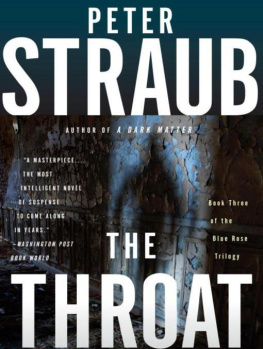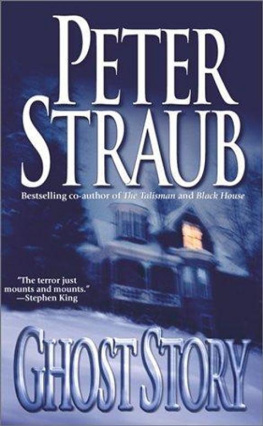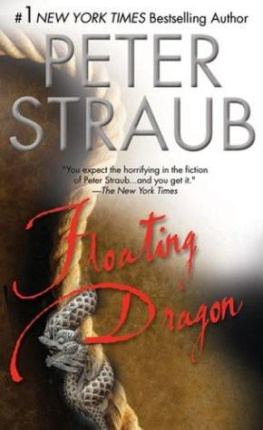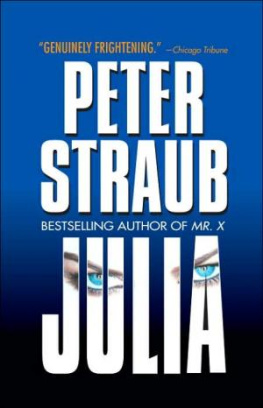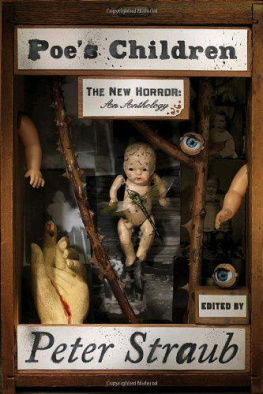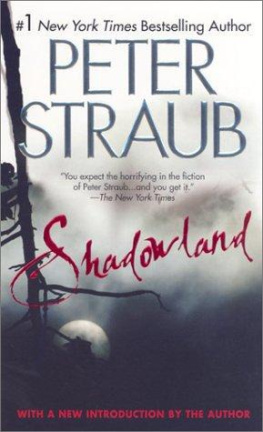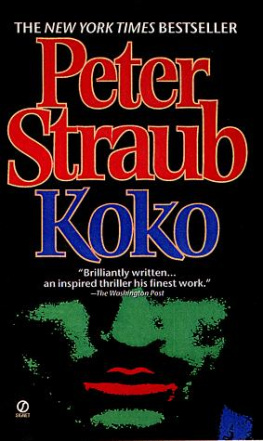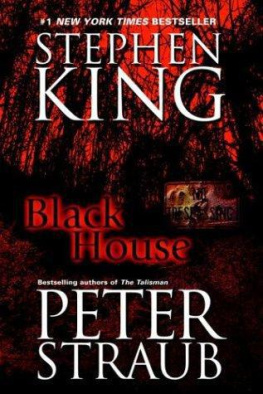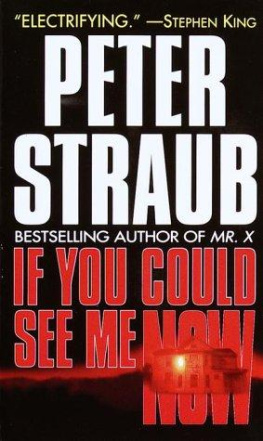Peter Straub - Blue Rose 3 The Throat
Here you can read online Peter Straub - Blue Rose 3 The Throat full text of the book (entire story) in english for free. Download pdf and epub, get meaning, cover and reviews about this ebook. year: 1994, publisher: Penguin Group (USA) Incorporated, genre: Detective and thriller. Description of the work, (preface) as well as reviews are available. Best literature library LitArk.com created for fans of good reading and offers a wide selection of genres:
Romance novel
Science fiction
Adventure
Detective
Science
History
Home and family
Prose
Art
Politics
Computer
Non-fiction
Religion
Business
Children
Humor
Choose a favorite category and find really read worthwhile books. Enjoy immersion in the world of imagination, feel the emotions of the characters or learn something new for yourself, make an fascinating discovery.
- Book:Blue Rose 3 The Throat
- Author:
- Publisher:Penguin Group (USA) Incorporated
- Genre:
- Year:1994
- Rating:3 / 5
- Favourites:Add to favourites
- Your mark:
- 60
- 1
- 2
- 3
- 4
- 5
Blue Rose 3 The Throat: summary, description and annotation
We offer to read an annotation, description, summary or preface (depends on what the author of the book "Blue Rose 3 The Throat" wrote himself). If you haven't found the necessary information about the book — write in the comments, we will try to find it.
Blue Rose 3 The Throat — read online for free the complete book (whole text) full work
Below is the text of the book, divided by pages. System saving the place of the last page read, allows you to conveniently read the book "Blue Rose 3 The Throat" online for free, without having to search again every time where you left off. Put a bookmark, and you can go to the page where you finished reading at any time.
Font size:
Interval:
Bookmark:
A being can only be touched where it yields. For a woman, this isunder her dress; and for a god it's on the throat of the animal beingsacrificed.
George Bataille, Guilty
I see again my schoolroom in Vyra, the blue roses of the wallpaper,the open window Everything is as it should be, nothing will everchange, nobody will ever die.
ACKNOWLEDGEMENTS
I owe thanks to all who helped by contributing their insight,intelligence, advice, stories, and support: Charles Bernstein; TomNoli; Hap Beasley; Scott Hamilton; Warren Vache; Lila Kalinich; JoeHaldeman; Eda Rak; my brother, John Straub; and my wondrous editor,Laurie Bernstein.
AN alcoholic homicide detective in my hometown of Millhaven,Illinois, William Damrosch, died to ensure, you might say, that thisbook would never be written. But you write what comes back to you, andthen afterward it comes back to you all over again.
I once wrote a novel called TheDivided Man about the Blue Rosemurders, and in that book I called Damrosch Hal Esterhaz. I neveralluded to my own connections to the Blue Rose murders, but thoseconnections were why I wrote the book. (There was one other reason,too.) I wanted to explain things to myselfto see if I could slicethrough to the truth with that old, old weapon, the battered old sword,of story telling.
I wrote The Divided Ma nafter I was processed out of the army andhad settled into a little room near Bang Luk, the central flower marketin Bangkok. In Vietnam I had killed several people at long distance andone close up, so close that his face was right before me. In Bangkok,that face kept coming back to me while I was writing. And with it came,attached like an enormous barnacle to a tiny boat, the other Vietnam,the Vietnam before Vietnam, of childhood. When my childhood begancoming back to me, I went off the rails for a bit. I became what youcould charitably call "colorful." After a year or so of disgrace, Iremembered that I was thirty-odd years old, no longer a child, that Ihad a calling of a kind, and I began to heal. Either childhood is a lotmore painful the second time around, or it's just less bearable. Noneof us are as strong or as brave as the children we used to be.
About a year after I straightened out, I came back to America andwound up writing a couple of books with a novelist named Peter Straub.These were called Koko and Mystery, and maybe you read them.It's okayif you didn't. Peter's a nice enough kind of guy, and he lives in a biggray Victorian house in Connecticut, just off Long Island Sound. He hasa wife and two kids, and he doesn't get out much. Peter's office on thethird floor of his house was the size of my whole loft on Grand Street,and his air conditioning and his sound system always worked.
Peter liked listening to my descriptions of Millhaven. He wasfascinated with the place. He understood exactly how I felt about it."In Millhaven, snow falls in the middle of summer," I'd say, "sometimesin Millhaven, flights of angels blot out the whole sky," and he'd beamat me for about a minute and a half. Here are some other things I toldhim about Millhaven: once, on the near south side of town, a band ofchildren killed a stranger, dismembered him, and buried the pieces ofhis body beneath a juniper tree, and later the divided and buried partsof the body began to call out to each other; once a rich old man rapedhis daughter and kept her imprisoned in a room where she raved anddrank, raved and drank, without ever remembering what had happened toher; once the pieces of the murdered man buried beneath the junipertree called out and caused the children to bring them together; once adead man was wrongly accused of terrible crimes. And once, when theparts of the dismembered man were brought together at the foot of thetree, the whole man rose and spoke, alive again, restored.
For we were writing about a mistake committed by the Millhavenpolice and endorsed by everyone else in town. The more I learned, theworse it got: along with everyone else, I had assumed that WilliamDamrosch had finally killed himself to stop himself from murderingpeople, or had committed suicide out of guilt and terror over themurders he had already done. Damrosch had left a note with the wordsblue rose on the desk in front of him.
But this was an error of interpretationof imagination. What most ofus call intelligence is really imaginationsympathetic imagination. TheMillhaven police were wrong, and I was wrong. For obvious reasons, thepolice wanted to put the case to rest; I wanted to put it to rest forreasons of my own.
I've been living in New York for six years now. Every couple ofmonths I take the New Haven Line from Grand Central, get off at theGreens Farms stop, and stay up late at night drinking and talking withPeter. He drinks twenty-five-year-old malt whiskey, because he's thatkind of guy, and I drink club soda. His wife and his kids are asleepand the house is quiet. I can see stars through his office skylight,and I'm aware of the black bowl of night over our heads, the hugedarkness that covers half the planet. Now and then a car swishes downthe street, going to Burying Hill Beach and Southport.
Koko described certainthings that happened to members of my oldplatoon in and after the war, and Mystery was about the long-delayedaftermath of an old murder in a Wisconsin resort. Because we liked theidea, we set the novel on a Caribbean island, but the main character,Tom Pasmorewho will turn up later in these pageswas someone I knewback in Millhaven. He was intimately connected with the Blue Rosemurders blamed on William Damrosch, and a big part of Mystery is hisdiscovery of this connection.
After Mystery I thought Iwas done with Damrosch, with Millhaven,and with the Blue Rose murders. Then I got a call from John Ransom,another old Millhaven acquaintance, and because much in his life hadchanged, my life changed too. John Ransom still lived in Millhaven. Hiswife had been attacked and beaten into a coma, and her attacker hadscrawled the words blue rose on the wall above her body.
I never knew John Ransom very well. He lived in a big house on theeast side and he went to Brooks-Lowood School. I lived in Pigtown, onthe fringes of the Valley, south of downtown Millhaven and a block fromthe St. Alwyn Hotel, and I went to Holy Sepulchre. Yet I knew himslightly because we were both tackles, and our football teams playedeach other twice a year. Neither team was very good. Holy Sepulchre wasnot a very big school, and Brooks-Lowood was tiny. We had about onehundred students in each grade. Brooks-Lowood had about thirty.
John Ransom said, "Hi," the first time we faced each other in agame. These preppies are a bunch of cupcakes, I thought. When playstarted, he hit me like a bulldozer and pushed me back at least a foot.The Brooks-Lowood quarterback, a flashy bit of blond arrogance namedTeddy Heppenstall, danced right past me. When we lined up for the nextplay, I said, "Well, hi to you, too," and we butted shoulders andforearms, utterly motionless, while Teddy Heppenstall romped down theother side of the field. I was sore for a whole week after the game.
Every November, Holy Sepulchre sponsored a Christian Athletes'Fellowship Dinner, which we called "the football supper." It was afundraiser held in the church basement. The administration invitedathletes from high schools all over Millhaven to spend ten dollars onhamburgers, potato chips, baked beans, macaroni salad, Hawaiian Punch,and a speech about Christ the Quarterback from Mr. Schoonhaven, ourfootball coach. Mr. Schoonhaven believed in what used to be calledmuscular Christianity. He knew that if Jesus had ever been handed afootball, He would have demolished anyone who dared get between Him andthe endzone. This Jesus bore very little resemblance to TeddyHeppenstall, and none at all to the soulful, rather stricken person whocupped His hands beneath His own incandescent heart in the garishportrait that hung just inside the church's heavy front doors.
Font size:
Interval:
Bookmark:
Similar books «Blue Rose 3 The Throat»
Look at similar books to Blue Rose 3 The Throat. We have selected literature similar in name and meaning in the hope of providing readers with more options to find new, interesting, not yet read works.
Discussion, reviews of the book Blue Rose 3 The Throat and just readers' own opinions. Leave your comments, write what you think about the work, its meaning or the main characters. Specify what exactly you liked and what you didn't like, and why you think so.

